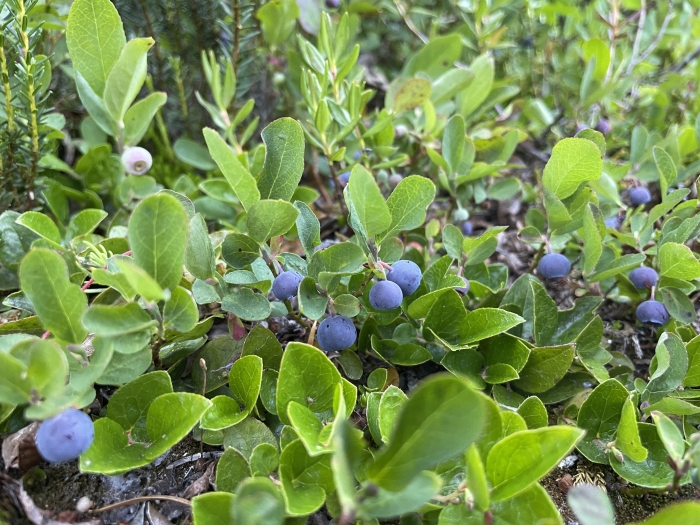Cascade Bilberry
(Vaccinium deliciosum)
Cascade Bilberry (Vaccinium deliciosum)
/
/

© Hilary Rose Dawson
CC BY 4.0
Image By:
© Hilary Rose Dawson
Recorded By:
Copyright:
CC BY 4.0
Copyright Notice:
Photo by: © Hilary Rose Dawson | License Type: CC BY 4.0 | License URL: http://creativecommons.org/licenses/by/4.0/ | Uploader: rosawoodsii | Publisher: iNaturalist |



























Estimated Native Range
Summary
Vaccinium deliciosum, commonly known as Cascade bilberry or blueleaf huckleberry, is a deciduous shrub native to the montane and subalpine regions of western North America, specifically from British Columbia to northern California, with isolated populations in Idaho. It thrives in open coniferous forests, often in acidic soils derived from volcanic rock, and is adapted to elevations of 1969-6562 feet. The plant typically forms dense, clumpy, matted shrubs that can reach up to 2 feet in height and spread to 3 feet wide. Its pale pink, urn-shaped flowers bloom in the late spring to early summer and are followed by waxy blue or reddish berries that ripen in late summer to early fall. The berries are edible and highly regarded for their flavor.
Cascade bilberry is valued for its ornamental qualities, including its attractive foliage, which takes on reddish tones in the fall, and its delicious berries, which can be used in culinary applications. It is a low-maintenance plant that requires minimal care once established, making it suitable for naturalistic plantings, wildlife gardens, and restoration projects. It prefers partial shade to full sun, acidic, well-drained soils, and consistent moisture, although it is somewhat drought-tolerant once established. While not commonly found in cultivation, it can be a rewarding addition to a native plant garden or a mixed shrub border.CC BY-SA 4.0
Cascade bilberry is valued for its ornamental qualities, including its attractive foliage, which takes on reddish tones in the fall, and its delicious berries, which can be used in culinary applications. It is a low-maintenance plant that requires minimal care once established, making it suitable for naturalistic plantings, wildlife gardens, and restoration projects. It prefers partial shade to full sun, acidic, well-drained soils, and consistent moisture, although it is somewhat drought-tolerant once established. While not commonly found in cultivation, it can be a rewarding addition to a native plant garden or a mixed shrub border.CC BY-SA 4.0
Plant Description
- Plant Type: Shrub
- Height: 1-2 feet
- Width: 1.5-2.5 feet
- Growth Rate: Slow, Moderate
- Flower Color: Pink, White
- Flowering Season: Spring, Summer
- Leaf Retention: Deciduous
Growth Requirements
- Sun: Full Sun
- Water: Medium
- Drainage: Medium
Common Uses
Bee Garden, Bird Garden, Edible*Disclaimer: Easyscape's listed plant edibility is for informational use. Always verify the safety and proper identification of any plant before consumption., Low Maintenance
Natural Habitat
Native to montane and subalpine regions of western North America, thriving in open coniferous forests
Other Names
Common Names: Blueleaf Huckleberry, Rainier Bilberry, Blue-Leaved Huckleberry, Cascade Blueberry, Cascade Huckleberry, Rainier Blueberry, Blue Huckleberry
Scientific Names: , Vaccinium deliciosum, Vaccinium forbesii,
GBIF Accepted Name: